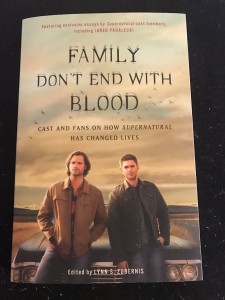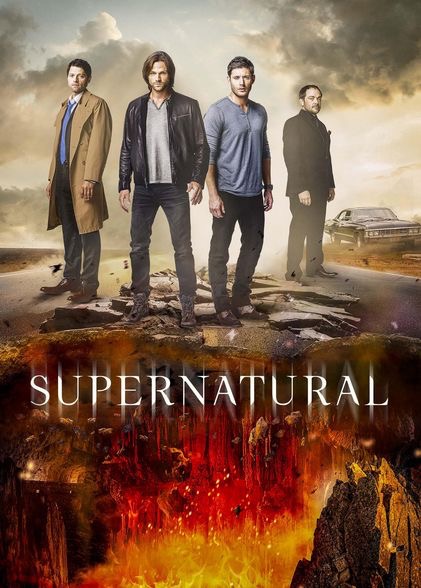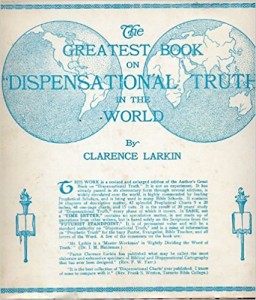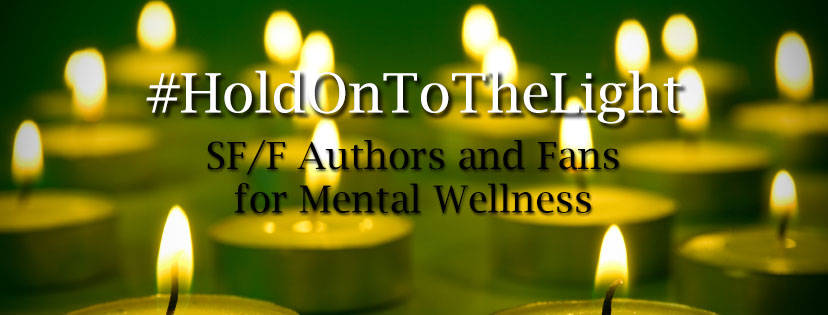I don’t usually write blog posts that are about someone else’s book. BUT–Lynn Zubernis asked for my ‘thinky thoughts’ about her new book, Family Don’t End With Blood, so here I go.
The story so far….Lynn runs the Fangasm Supernatural fan site and is @FangasmSPN on Twitter. She’s very active at SPN conventions and both she and Laurena Aker of the WinchesterFamilyBusiness site are pillars of the Supernatural fandom community. Family Don’t End With Blood is Lynn’s new book about how Supernatural–the show, the characters, the actors and the fandom–changed lives and helped people through depression, anxiety, self-harm, suicidal thoughts, grief, physical challenges, self-harm and other issues. It includes interviews with actors, fans and others who are part of the SPNFamily.
 I knew I was in trouble when I choked up on the introduction. Trust me when I say I’m not a big crier. I was teary before I was even into the first essay. Not sad tears, but that sense you get when you come home and know it.
I knew I was in trouble when I choked up on the introduction. Trust me when I say I’m not a big crier. I was teary before I was even into the first essay. Not sad tears, but that sense you get when you come home and know it.
I’ve talked candidly about how fandom saved my life when I was 15. And I’ve also talked about why, in these frightening and unstable times, we fans need each other and our fandoms more than ever. And I’ve also shared how Jared Padalecki and Jensen Ackles’ #AlwaysKeepFighting (#AKF) campaign via the Supernatural fandom inspired me to pull together 100 science fiction/fantasy authors for the #HoldOnToTheLight campaign.
Fandom has been part of my life since I was about 15. Now that I’m an author of epic fantasy, urban fantasy and steampunk, I’m not only a fan, but I’m up on the stage on panels, talking about how we create the worlds readers escape into, as well as other fannish interests. Most of my friends are involved in fandom at some level or another, either as pros or fans–or both. I travel for about 15 sci-fi/fantasy conventions a year all over the U.S. and sometimes Canada. I am writing eight novels this year, plus some short stories and novellas. I spend most of my waking hours surrounded by the characters in my books. So I take fandom very seriously.
I came late to the party on Supernatural, diving into the show during late S11 and got completely caught up on all eleven seasons plus all the tie-in books (and reading more fan fiction than I will admit to sober) by the start of Season 12. I haven’t gone this deep into a fandom since the first Star Wars movie came out in 1977. And gradually, I came to understand why.
I knew about Supernatural because one of my daughters had watched it when the show first came out and she said I would like it. Then last April, all of a sudden it seemed like the right time to start in. I was hooked from the start, and we binge watched a couple of episodes each night. Little did I know that I was also just heading into a storm of personal upsets and set backs that still hasn’t fully worked its way out. I found myself getting immersed in the show–and then the books and the fan fiction–as a way to hang on.
One of the first ways Supernatural changed me happened when I saw how much good came out of the #AlwaysKeepFighting campaign. I was really impressed that Jared and Jensen and Misha would use their platform to do something so personal and important. That got me thinking. Writers aren’t famous like actors, but our books create the worlds that inspire TV shows and movies–we create the genre. I know a lot of writers, and I also knew that we all had our own demons. So I asked 100 of my author friends if they would be willing to write a post on their own blogs about how mental health issues like depression, suicide, PTSD, anxiety, self-harm, etc. had affected them, someone they loved, their characters and their writing. I called it #HoldOnToTheLight, and the goal was to decrease the stigma about mental health issues within fandom, to stand in solidarity with fans, and to encourage readers to seek help. You can find more about #HoldOnToTheLight and the master post of blogs at www.HoldOnToTheLight.com. We also encouraged convention runners to add panels on mental health to con programming or to expand/promote panels they already offered. The list of cons with those panels is growing, and now includes GenCon (approx. 70K attendees) and Dragon*Con (approx 80K attendees).
But Supernatural wouldn’t let me go–and going through a personal rough patch, I dove in deeper. I found my way into online fandom, first by immersing myself in fan fiction, fan videos and art, and then gradually getting involved in the lively, ongoing conversation on Twitter.
That’s how I met Nightsky, and as we chatted–first with tweets, then direct messages, then emails–she asked me to do a guest blog post for Winchester Family Business based on some comments I’d made. Then I was heading to Chicago to a non-SPN convention, and we agreed to meet up between my panels. We ended up spending most of the day together and having a wonderful dinner, and then continuing the conversation via email afterwards. I’ve written another guest blog since then for WFB and might do so again. Along the way, I started to live tweet the new episodes, and met even more fans. Now going out on Twitter is a highlight and social point of my day, responding to conversations, posting photos and memes, and enjoying the SPNFamily’s online companionship. I’m still not through that rough patch, but the SPNFamily is helping me hang on–they mean more to me than I can express, and I hope I can pay the favor forward.
There’s one more reason Supernatural is so special to me, and I didn’t realize it until I was well into season six.
Sam and Dean faced down the specter that dominated my childhood and convinced me that I would never live long enough to become an adult: the Apocalypse.
Now maybe that sounds strange. But I grew up in a church that expected the literal Biblical Apocalypse/Rapture/Armageddon to happen any day. And simultaneously, my parents were involved in the far right’s conspiracy-fueled underground expecting a Communist take-over (a la the Chinese Cultural Revolution and Stalin’s purges) to happen at any time. (Note: I disavowed both these religious and political views decades ago, but they unquestionably warped my childhood and framed my world view as a child/adolescent.)
 One of my favorite books as a child and pre-teen was Clarence Larkin’s The Greatest Book of Dispensational Truth. It was–I kid you not–an illustrated, fold-out guide to the Apocalypse that did not consider itself to be fiction. If you wonder where Supernatural got its horsemen, Leviathans, the Witnesses, the Seals, the Whore of Babylon, the Beast, the AntiChrist and so much more–it’s all in there, in pictures. Larkin and John Nelson Darby popularized the Rapture and Armageddon mythos by reading several prophetic books of the Bible (Ezekiel, Daniel and Revelation as well as the apocryphal book of Enoch–yes, it’s where Enochian comes from) and interpreting them outside of generally accepted methods of textual criticism and archeological/cultural study. In other words, they in a sense wrote fan fiction of the Bible, and it stuck.
One of my favorite books as a child and pre-teen was Clarence Larkin’s The Greatest Book of Dispensational Truth. It was–I kid you not–an illustrated, fold-out guide to the Apocalypse that did not consider itself to be fiction. If you wonder where Supernatural got its horsemen, Leviathans, the Witnesses, the Seals, the Whore of Babylon, the Beast, the AntiChrist and so much more–it’s all in there, in pictures. Larkin and John Nelson Darby popularized the Rapture and Armageddon mythos by reading several prophetic books of the Bible (Ezekiel, Daniel and Revelation as well as the apocryphal book of Enoch–yes, it’s where Enochian comes from) and interpreting them outside of generally accepted methods of textual criticism and archeological/cultural study. In other words, they in a sense wrote fan fiction of the Bible, and it stuck.
When these frightening images are part of what all the adults around you accept as real and inevitable, it is terrifying to a child–like finding out that the monster under the bed is real. It was too big to handle, and the only advice from adults was just to make sure my soul was ok when it came my time to die.
At the same time, my parents got pulled into a secretive network of conspiracy theorists who believed that Communists had infiltrated the world governments at every level and that–any day now–we were all either going to die or be imprisoned in gulags. One of my earliest memories is my mom coaching me on how to behave when the day came that we would be taken to a prison camp. I think I was around four or five.
My uncle got us into it. He had been in infantry and then tanks in World War II and saw combat in the Battle of the Bulge. I believe he returned with severe PTSD, which went untreated and unacknowledged, and I think it made him vulnerable to the nightmarish scenarios of the conspiracies. My uncle’s friends were also WWII vets. They passed information via short-wave radio (no internet back in the 1970s), through secret get-togethers, and by word of mouth–always wary that ‘They’ were watching.
 So I grew up with people who stockpiled ammo and hid guns in the walls of their houses, who had bunkers and safe houses, who talked about keeping a stash of silver coins on hand so that when–not if–the banks collapsed and currency lost its value, we could run and go to ground. I grew up with caches of freeze-dried food–enough to last five years–and survivalist tactics and friends who trained their kids to strip a gun blindfolded. My uncle and his friends saw themselves as the thin gray line of sentries in a war against evil, willing to die for a cause kept secret because others would think it was crazy.
So I grew up with people who stockpiled ammo and hid guns in the walls of their houses, who had bunkers and safe houses, who talked about keeping a stash of silver coins on hand so that when–not if–the banks collapsed and currency lost its value, we could run and go to ground. I grew up with caches of freeze-dried food–enough to last five years–and survivalist tactics and friends who trained their kids to strip a gun blindfolded. My uncle and his friends saw themselves as the thin gray line of sentries in a war against evil, willing to die for a cause kept secret because others would think it was crazy.
I don’t think John Winchester and Bobby Singer would have shared the political views of my uncle and his friends, but they could have walked into the room and had a drink with them and understood those guys. They were damaged men, trying to do the best they could, protecting the people they loved.
Shedding those two pervasive world views that had shaped my understanding of reality nearly destroyed me as a teenager in my college years. Fandom and my early attempts at writing the novel which would someday become The Summoner kept me alive. Back then, I discovered I could entertain and amuse my friends by writing fan fiction for Star Wars, Star Trek, Space: 1999 and other shows. We passed the typed or hand-written stories around at convention room parties in the early 1980s. For a short time, I even ran a fanzine.
I belonged in fandom the way I didn’t ever belong in my birth family, at my church, at my college or with most of the people I knew growing up. Inside fandom, I was safe. Inside fandom, people understood and liked the same things I did, they got the jokes and the catchphrases. They validated, affirmed and encouraged. We might have been freaks to the outside world, but we were freaks together.
When I started watching Supernatural, I didn’t realize the connection at first. Then one day, it hit me and I was poleaxed. Sam and Dean faced down my personal bogeyman–the Apocalypse–and survived. Scarred, yes, but still standing and stronger than before. True heroes.
So when I read Lynn’s awesome book and the essays by creators, actors and fans alike about the strength and healing of the fandom family, I totally understand. I cherish my time at conventions when I can be with my tribe–although the events at which I’m a panelist are general sci-fi/fantasy cons instead of the SPN cons (which do sound like a lot of fun). I’m so thrilled that because of Supernatural, a much larger group of people have come into fandom and found that refuge. We all find our corner of fandom, whether it’s books, movies, TV shows, cosplay, gaming, LARP, comics, filk music, art or a mix of all of those.
One of the most affirming thing you can hear as an author is that your book and characters got someone through a hard time. I have read books by favorite authors that got me through depression, loneliness, deaths in the family, and stressful circumstances. And my most cherished notes from readers are the ones who tell me that my books kept them company at the bedside of a dying loved one, got them through two tours of duty in Afghanistan, or otherwise helped them survive hard times.
As Lynn shares in her book, that two-way support is taken to a whole new level of special with the Supernatural fandom and its creators and actors. I’ve seen that kind of support in action, and I know how powerful it can be, and how wonderful it is to belong to a community that welcomes you and encourages you to be your real self.
I’ve felt that welcome myself as a newcomer to SPNFamily–take a look at my Twitter feed, It’s turned Twitter into one of my favorite activities. I look forward to seeing what new wonderful comments and photos my SPNFamily is going to share that day, and enjoy trying to return the favor. Getting adopted by this wonderful group of people has meant a lot to me.
So go buy Lynn’s book. Give it to a friend who needs encouragement. But even more importantly, continue being the wonderful fandom and SPNFamily you already are and be there for each other. Because family really doesn’t end with blood–in the end, our true families are the people we choose.











